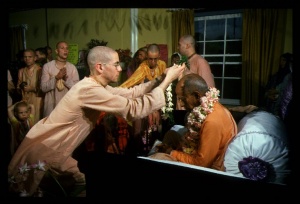SB 7.3.1: Difference between revisions
m (1 revision(s)) |
No edit summary |
||
| Line 1: | Line 1: | ||
{{info | {{info | ||
|speaker= | |speaker=Nārada Muni | ||
|listener= | |listener=King Yudhiṣṭhira | ||
}} | }} | ||
[[Category:Srimad-Bhagavatam - Canto 07 Chapter 03|s01 ]] | |||
[[Category:Bhagavatam Verses Spoken by Narada Muni - Vanisource|070301]] | |||
<div style="float:left">'''[[Srimad-Bhagavatam]] - [[SB 7|Seventh Canto]] - [[SB 7.3: Hiranyakasipu's Plan to Become Immortal|Chapter 3: Hiraṇyakaśipu's Plan to Become Immortal]]'''</div> | |||
<div style="float:right">[[File:Go-previous.png|link=SB 7.3 Summary]] '''[[SB 7.3 Summary]] - [[SB 7.3.2]]''' [[File:Go-next.png|link=SB 7.3.2]]</div> | |||
{{RandomImage}} | |||
==== TEXT 1 ==== | ==== TEXT 1 ==== | ||
<div | <div class="verse"> | ||
śrī-nārada uvāca | :śrī-nārada uvāca | ||
hiraṇyakaśipū rājann | :hiraṇyakaśipū rājann | ||
ajeyam ajarāmaram | :ajeyam ajarāmaram | ||
ātmānam apratidvandvam | :ātmānam apratidvandvam | ||
eka-rājaṁ vyadhitsata | :eka-rājaṁ vyadhitsata | ||
</div> | </div> | ||
| Line 18: | Line 23: | ||
==== SYNONYMS ==== | ==== SYNONYMS ==== | ||
<div | <div class="synonyms"> | ||
śrī-nāradaḥ | ''śrī-nāradaḥ uvāca''—Nārada Muni said; ''hiraṇyakaśipuḥ''—the demoniac king Hiraṇyakaśipu; ''rājan''—O King Yudhiṣṭhira; ''ajeyam''—unconquerable by any enemy; ''ajara''—without old age or disease; ''amaram''—immortal; ''ātmānam''—himself; ''apratidvandvam''—without any rival or opponent; ''eka-rājam''—the one king of the universe; ''vyadhitsata''—desired to become. | ||
</div> | </div> | ||
| Line 25: | Line 30: | ||
==== TRANSLATION ==== | ==== TRANSLATION ==== | ||
<div | <div class="translation"> | ||
Nārada Muni said to Mahārāja Yudhiṣṭhira: The demoniac king Hiraṇyakaśipu wanted to be unconquerable and free from old age and dwindling of the body. He wanted to gain all the yogic perfections like aṇimā and laghimā, to be deathless, and to be the only king of the entire universe, including Brahmaloka. | Nārada Muni said to Mahārāja Yudhiṣṭhira: The demoniac king Hiraṇyakaśipu wanted to be unconquerable and free from old age and dwindling of the body. He wanted to gain all the yogic perfections like aṇimā and laghimā, to be deathless, and to be the only king of the entire universe, including Brahmaloka. | ||
</div> | </div> | ||
| Line 32: | Line 37: | ||
==== PURPORT ==== | ==== PURPORT ==== | ||
<div | <div class="purport"> | ||
Such are the goals of the austerities performed by demons. Hiraṇyakaśipu wanted to receive a benediction from Lord Brahmā so that in the future he would be able to conquer Lord Brahmā's abode. Similarly, another demon received a benediction from Lord Śiva but later wanted to kill Lord Śiva through that same benediction. Thus self-interested persons, by demoniac austerity, want to kill even their benedictors, whereas the Vaiṣṇava wants to remain an ever-existing servant of the Lord and never to occupy the post of the Lord. Through sāyujya-mukti, which is generally demanded by asuras, one merges into the existence of the Lord, but although one sometimes thus achieves the goal of the theory of monism, one falls down again to struggle in material existence. | Such are the goals of the austerities performed by demons. Hiraṇyakaśipu wanted to receive a benediction from Lord Brahmā so that in the future he would be able to conquer Lord Brahmā's abode. Similarly, another demon received a benediction from Lord Śiva but later wanted to kill Lord Śiva through that same benediction. Thus self-interested persons, by demoniac austerity, want to kill even their benedictors, whereas the Vaiṣṇava wants to remain an ever-existing servant of the Lord and never to occupy the post of the Lord. Through ''sāyujya-mukti'', which is generally demanded by ''asuras'', one merges into the existence of the Lord, but although one sometimes thus achieves the goal of the theory of monism, one falls down again to struggle in material existence. | ||
</div> | </div> | ||
__NOTOC__ | |||
<div style="float:right; clear:both;">[[File:Go-previous.png|link=SB 7.3 Summary]] '''[[SB 7.3 Summary]] - [[SB 7.3.2]]''' [[File:Go-next.png|link=SB 7.3.2]]</div> | |||
__NOTOC__ | |||
__NOEDITSECTION__ | |||
Revision as of 18:47, 25 May 2021

A.C. Bhaktivedanta Swami Prabhupada
TEXT 1
- śrī-nārada uvāca
- hiraṇyakaśipū rājann
- ajeyam ajarāmaram
- ātmānam apratidvandvam
- eka-rājaṁ vyadhitsata
SYNONYMS
śrī-nāradaḥ uvāca—Nārada Muni said; hiraṇyakaśipuḥ—the demoniac king Hiraṇyakaśipu; rājan—O King Yudhiṣṭhira; ajeyam—unconquerable by any enemy; ajara—without old age or disease; amaram—immortal; ātmānam—himself; apratidvandvam—without any rival or opponent; eka-rājam—the one king of the universe; vyadhitsata—desired to become.
TRANSLATION
Nārada Muni said to Mahārāja Yudhiṣṭhira: The demoniac king Hiraṇyakaśipu wanted to be unconquerable and free from old age and dwindling of the body. He wanted to gain all the yogic perfections like aṇimā and laghimā, to be deathless, and to be the only king of the entire universe, including Brahmaloka.
PURPORT
Such are the goals of the austerities performed by demons. Hiraṇyakaśipu wanted to receive a benediction from Lord Brahmā so that in the future he would be able to conquer Lord Brahmā's abode. Similarly, another demon received a benediction from Lord Śiva but later wanted to kill Lord Śiva through that same benediction. Thus self-interested persons, by demoniac austerity, want to kill even their benedictors, whereas the Vaiṣṇava wants to remain an ever-existing servant of the Lord and never to occupy the post of the Lord. Through sāyujya-mukti, which is generally demanded by asuras, one merges into the existence of the Lord, but although one sometimes thus achieves the goal of the theory of monism, one falls down again to struggle in material existence.